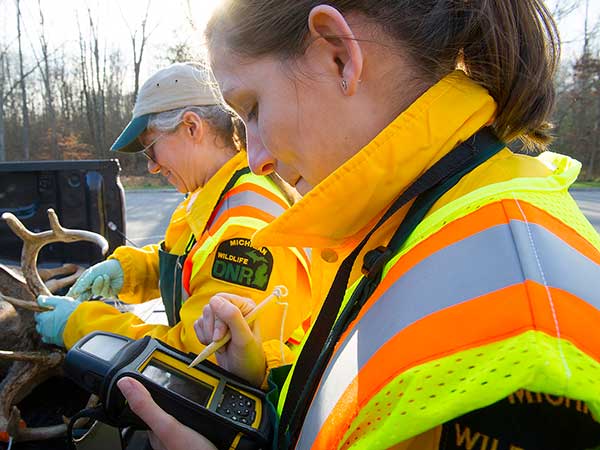- Details
(Provided by Michigan DNR)
Michigan DNR conservation officers in southwest Michigan recently conducted enforcement operations targeting illegal importation of harvested deer into Michigan from states with chronic wasting disease (CWD) in their free-ranging deer herds.
Conservation officers conducted operations near the I-94 corridor of the Michigan/Indiana border, resulting in the seizure of six harvested deer. Five deer were transported into Michigan from Illinois, and one was transported from Wisconsin. Michigan law prohibits importing deer from CWD-positive states and provinces.
Five Michigan residents have been charged with the illegal transportation of deer into the state. They will be arraigned in the 5th District Court in Berrien County. Violation of Michiganís wildlife importation laws may result in fines ofup to $500 and up to 90 days in jail.
- Details
(Provided by Michigan DNR)
The Michigan DNR offers a Report All Poaching (RAP) reward for information leading to the arrest and conviction of the individual who shot a gray wolf in Houghton County Saturday.
The shooting took place along M-26, one half-mile south of Twin Lakes.
DNR conservation officers said the shooterís vehicle would have been parked along the west shoulder of M-26, heading southwest. The shooting took place sometime between the hours of 10 a.m. and 1:30 p.m. EST.
"The subject shot from the vehicle and struck the wolf as it was standing on the snowmobile trail (Trail No. 3) to the west of the highway," said Sgt. Grant Emery of the DNRís Baraga Field Office.
Gray wolves are a federally endangered species and are protected in Michigan. Wolves cannot legally be killed except in the defense of human life.
- Details
 Deer Check StationMost Michigan deer hunters have been in the woods as much as possible during this firearm deer hunting season.
Deer Check StationMost Michigan deer hunters have been in the woods as much as possible during this firearm deer hunting season.
However, one group of deer hunters - members of the DNR Wildlife Division - have given up some of their days afield to check other hunters' deer at check stations around the state.
Collecting valuable data about the state's deer population is something the DNR has been doing for decades.
The DNR is aided in its efforts by students and other volunteers and through partnerships with meat processors, taverns, recreation vehicle dealers and other businesses that provide some of the most popular check station venues.
"We get a ton of information from our hunters," said Chad Stewart, the DNR's deer specialist, who is located at the Rose Lake Research Center. "It's the one time of year when we can really get our hands on so many deer."
- Details
Provided by Michigan DNR
Last week, the Michigan Department of Natural Resources responded to calls of a male mule deer lying on the side of the road in a rural area of Eaton County. The antlers had been removed and the animal was field-dressed, though DNR staff determined, after close X-ray examination, the animal was killed by a vehicle. There were no bullet holes or lead fragments, but there were numerous broken ribs and other trauma indicative of a deer/vehicle collision. Since there are no registered mule deer in Michigans privately owned cervid facilities, it is believed that this carcass was brought into Michigan from somewhere out west.
Mule deer are located in western North America. The most noticeable differences between white-tailed and mule deer are the size of their ears, the color of their tails and the configuration of their antlers. The mule deer's tail is black-tipped and their antlers "fork" as they grow, rather than branch from a single main beam, as is the case with white-tails.
The fact that this was called into the DNR indicates that our chronic wasting disease (CWD) communications are being received by some, but there are clearly more individuals to reach, said Chad Stewart, DNR deer specialist. We received more than one call that this deer didnt seem to be a white-tail and that we needed to have it picked up and tested. We would like to thank everyone who called in.
- Details
The Michigan Natural Resources Commission approved several fishing regulations last week in Lansing.
All regulations immediately went into effect and will remain in effect for the 2016 fishing season (which begins April 1).
All of the changes are highlighted below and also will be reflected shortly in the online version of the 2015 Michigan Fishing Guide, available at www.michigan.gov/fishingguide.


